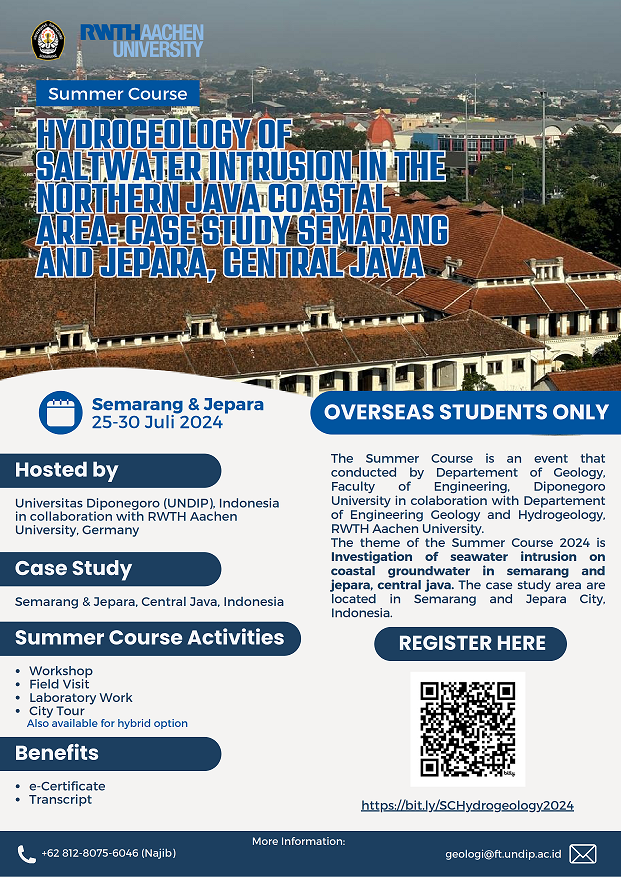Summer Course on Hydrogeology
Department of Geological Engineering, Universitas Diponegoro
July 2024
General Topic
“Hydrogeology of saltwater intrusion in the northern Java coastal area: case study Semarang and Jepara, Central Java”
About
Saltwater intrusion is a natural phenomenon that allows the infiltration of saline water into aquifers. However, this natural process can be made worse by human activities. Groundwater withdrawal in coastal aquifers lowers the water table in the vicinity of the shoreline below sea level. Decades of exploitation of water resources allows the interface between saltwater and freshwater to advance inland. Therefore, groundwater quality will deteriorate and become useless to meet human needs. There are more challenges in coastal water management than we already know. Research and investigation effort must be devoted to understand better coastal aquifer flow to avoid further degradation. In this program, we will investigate the hydrogeological basis of saltwater intrusion and describe specific cases in Semarang and Jepara, Central Java, where the condition is accelerated due to land subsidence and sea level rise. These activities are essential to understand the environmental problems and water resources management in the coastal areas.
Speakers
Prof. Thomas R. Rüde (Institute of Hydrogeology, RWTH Aachen University)
Prof. Agus Setyawan (Faculty of Science and Mathematics, Universitas Diponegoro)
Najib, S.T., M.Eng., Ph.D (Faculty of Engineering, Universitas Diponegoro)
Schedule
July 25th – 30th, 2024
Participants
International students who keen to learn and discuss more on hydrogeology and hydrogeochemistry in coastal areas (undergraduate and post-graduate are welcomed to participate).
Platform
The program will be conducted as hybrid courses for international students. Selected student will attend the course in-class and in-field as per the activities listed below. To support other international students who cannot attend in person, we will also conduct the course online. Students who attend online will receive lectures via Zoom meeting, virtual field trip via YouTube stream, file materials and data to be analysed and presented online (schedule will be different and adjusted approximately one day later than offline course).
Activities
Day 1
Lectures at Faculty of Engineering Universitas Diponegoro
- Geology of Semarang and surrounding area
- Saltwater intrusion in Semarang Urban Area
Day 2
Field Trip in Semarang
- Fieldwork: field observation, measuring water quality parameter, and water sampling from shallow wells at Tapak Village
- Mangrove planting at conservation area of Tirang Beach
Day 3 – 4
Field Trip in Jepara
- Fieldwork: field observation, measuring water quality parameter, and water sampling from shallow wells at Teluk Awur
- Visiting Bandengan Beach
Day 5
Laboratory work, analysis, and group discussion at Department of Geological Engineering, Universitas Diponegoro
Day 6
Semarang cultural and city tour
Benefit
Certificate of Participation
Transcript (from partner university only)
Registration
To register for the Summer Course Program, please click this link: https://bit.ly/SCHydrogeology2024
Contact us
Najib: +62 812-8075-6046
geologi@ft.undip.ac.id

